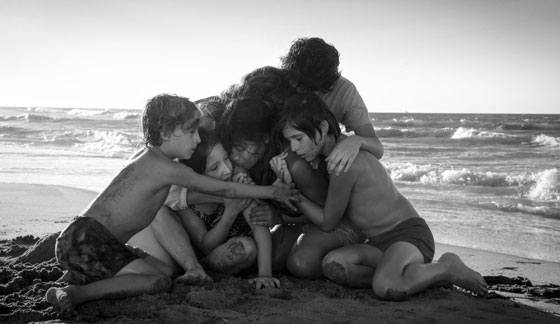Starring: Yalitza Aparicio, Marina de Tavira and Fernando Grediaga
Directed By: Alfonso Cuaron
Rated: R
Running Time: 135 minutes
Netflix
You know the phrase, “a slice of Americana,” or at the least the variations of it? In pop-culture it’s used to describe pop-culture that capture a moment in time, with the values and ideas reflected in the American characters on screen. Classics like “The Best Years of Our Lives” or “A Christmas Story” come to mind, while its contemporary cohorts are films like “Mudbound” or “Friday Night Lights.” Alfonso Cuaron’s latest movie, “Roma,” could be called a slice of Mexicana.
Cuaron returns to his roots in “Roma,” a film about Sofia’s (Tavira) strained household in Mexico City in the early 1970s. Living under the roof is Sofia’s four children, her mother, her “husband,” and two maids. The drama involving Sofia and her husband, who are separating, is placed on the backburner to stew to its natural boiling point towards the end of the movie. But one of her maids, Cleo (Aparicio), is surprisingly the core drama for most of the film. That’s because Cleo believes she’s pregnant and once she shares this news with her boyfriend, he quickly abandons her in the worst possible way. Unfortunately things don’t get any better for Cleo.
So much transpires in such little time, and sometimes in such few words, that “Roma” feels like the most poignant chapter of an autobiography. At face value, there’s nothing extraordinary about the people in the Sofia household, but because Cuaron captures the seesawing family dynamics so perfectly, it’s hard to look away during some of the film’s simplest scenes. It also makes some of the most emotionally devastating scenes, and there are several, much more impactful and riveting.
The actors in “Roma,” who’ve never starred in anything before or aren’t household names in the U.S., but are in Mexico, are outstanding here. Kudos to Cuaron for finding Aparico, who effortlessly handles the hefty amount of emotion, her character demands. This is her first role and certainly won’t be her last. The multi-layered maternal roles that Aparico and Tavira tackle are difficult, but their performances are nuanced and subtle, but speak volumes about gender roles, whether it be in society as a whole or in the Sofia household.
While Cuaron broke visual ground in “Gravity,” he proves to be an equally captivating director with the classic panoramic format, capturing rarely before seen beauty in the black and white picture. Even in monochromatic, the city streets pop, the seaside is picturesque, and the surrounding mountains have never looked more beautiful. Nearly every facet of “Roma” has been meticulously groomed by Cuaron, whose letting us watch him blow a kiss to his native land as tears fall from his eyes.


